 On June 15 at 10:45 PM Tapasa Prabhu, leader and TP of ISKCON Stockholm, Sweden, and a veteran Scandinavian devotee, left his body surrounded by devotees chanting the Hare Krishna-mantra. His departure is truly a loss to ISKCON devotees in Sweden and Scandinavia who had his association for close to 45 years. Tapasa Prabhu was
On June 15 at 10:45 PM Tapasa Prabhu, leader and TP of ISKCON Stockholm, Sweden, and a veteran Scandinavian devotee, left his body surrounded by devotees chanting the Hare Krishna-mantra. His departure is truly a loss to ISKCON devotees in Sweden and Scandinavia who had his association for close to 45 years. Tapasa Prabhu wasRead More...









.jpg)










 Srivasa Pandita is one of the members of the Pancha-tattva:sri-krsna-caitanya prabhu-nityananda sri-advaita gadadhara srivasa. Vedic authorities state that in the current Age of Kali, Krishna came as Sri Chaitanya Mahaprabhu and Balarama came as Sri Nityananda Prabhu. Similarly, Maha-vishnu appeared as Advaita Acharya, Srimati Radharani as Gadadhara Pandita, and Narada Muni as Srivasa Pandita.
Srivasa Pandita is one of the members of the Pancha-tattva:sri-krsna-caitanya prabhu-nityananda sri-advaita gadadhara srivasa. Vedic authorities state that in the current Age of Kali, Krishna came as Sri Chaitanya Mahaprabhu and Balarama came as Sri Nityananda Prabhu. Similarly, Maha-vishnu appeared as Advaita Acharya, Srimati Radharani as Gadadhara Pandita, and Narada Muni as Srivasa Pandita. I was doing sankirtan on Auckland’s Queen Street when I stopped a guy who looked vaguely familiar. Turns out we’d met four years ago, and apparently I tried to give him a book back then. “Yeah, I almost took it,” he reflected, “but I wasn’t ready for the good stuff yet.” Then he surprised me:
I was doing sankirtan on Auckland’s Queen Street when I stopped a guy who looked vaguely familiar. Turns out we’d met four years ago, and apparently I tried to give him a book back then. “Yeah, I almost took it,” he reflected, “but I wasn’t ready for the good stuff yet.” Then he surprised me:



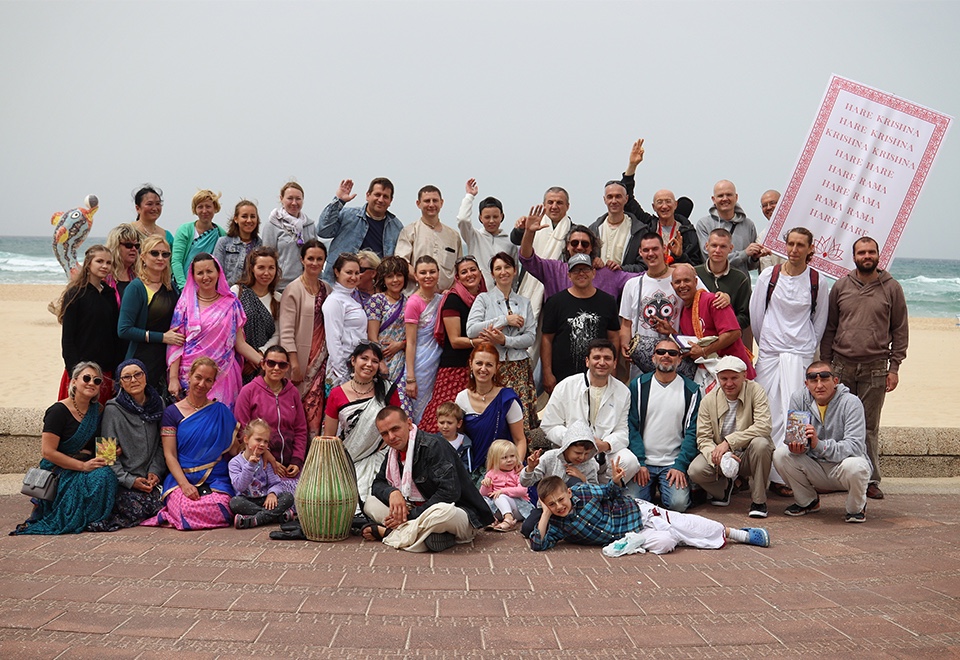 Dear Devotees, You are likely aware of the intense conflict currently taking place between Israel and Iran. There are many ISKCON Vaishnavas in both countries. Devotees in Tehran have been evacuated to other cities for their safety. In Tel Aviv, everything is shut down — even public transportation — and devotees are spending a significant
Dear Devotees, You are likely aware of the intense conflict currently taking place between Israel and Iran. There are many ISKCON Vaishnavas in both countries. Devotees in Tehran have been evacuated to other cities for their safety. In Tel Aviv, everything is shut down — even public transportation — and devotees are spending a significant
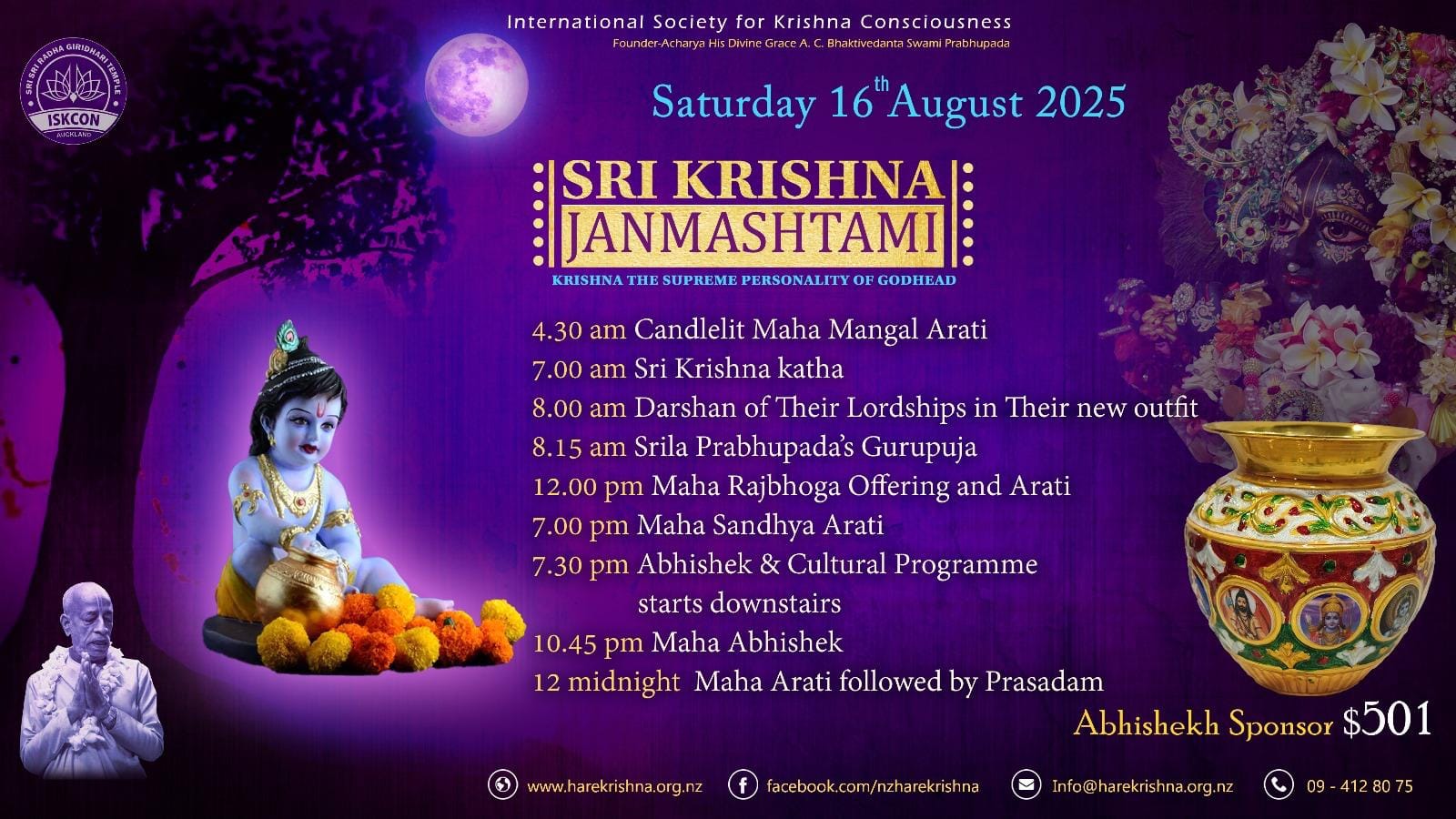
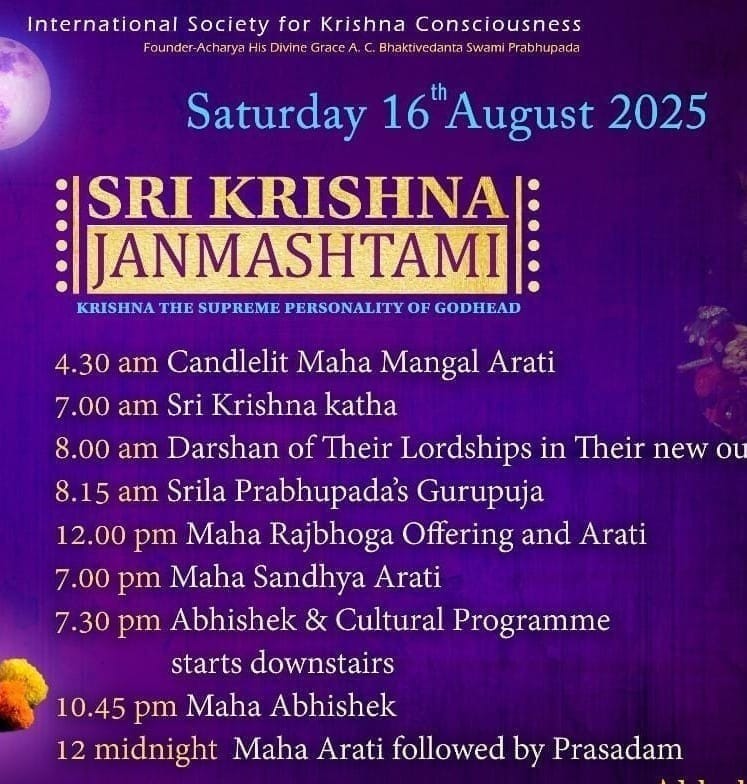
 “HARE KRISHNA! The Mantra, the Movement and the Swami who started it all” is now FREE on YouTube in 10 major languages: Hindi, Bengali, Gujarati, Marathi, Tamil, Telugu, Kannada, Malayalam, English & Russian with short versions of 29 minutes & 47 minutes for schools, universities, etc. Watch on the YouTube channel: https://www.youtube.com/playlist?app=desktop&list=PLAXmpRpkhy4e4H03cVer7pLt1-QQyIrKs
“HARE KRISHNA! The Mantra, the Movement and the Swami who started it all” is now FREE on YouTube in 10 major languages: Hindi, Bengali, Gujarati, Marathi, Tamil, Telugu, Kannada, Malayalam, English & Russian with short versions of 29 minutes & 47 minutes for schools, universities, etc. Watch on the YouTube channel: https://www.youtube.com/playlist?app=desktop&list=PLAXmpRpkhy4e4H03cVer7pLt1-QQyIrKs Today is the appearance day of Sri Vakresvara Pandita, one of Lord Chaitanya’s most dear associates. Sri Caitanya-caritamrta (Adi 10.17–20) states, “Vakresvara Pandita, the fifth branch of the [Caitanya] tree, was a very dear servant of Lord Caitanya’s. He could dance with constant ecstasy for seventy-two hours. Sri Caitanya Mahaprabhu personally sang while Vakresvara Pandita danced, and thus Vakresvara Pandita fell at the lotus feet of the Lord and spoke as follows. ‘O Candramukha! Please give me ten thousand Gandharvas. Let them sing as I dance, and then I will be greatly happy.’ Lord Caitanya replied, ‘I have only one wing like you, but if I had another, certainly I would fly in the sky!’ ”
Today is the appearance day of Sri Vakresvara Pandita, one of Lord Chaitanya’s most dear associates. Sri Caitanya-caritamrta (Adi 10.17–20) states, “Vakresvara Pandita, the fifth branch of the [Caitanya] tree, was a very dear servant of Lord Caitanya’s. He could dance with constant ecstasy for seventy-two hours. Sri Caitanya Mahaprabhu personally sang while Vakresvara Pandita danced, and thus Vakresvara Pandita fell at the lotus feet of the Lord and spoke as follows. ‘O Candramukha! Please give me ten thousand Gandharvas. Let them sing as I dance, and then I will be greatly happy.’ Lord Caitanya replied, ‘I have only one wing like you, but if I had another, certainly I would fly in the sky!’ ” Srila Prabhupada expressed his appreciation for his father in his dedication to his book Krsna, the Supreme Personality of Godhead: “To My Father, Gour Mohan De (1849-1930)—A pure devotee of Krsna, who raised me as a Krsna conscious child from the beginning of my life. In my boyhood ages he instructed me how to play the mrdanga. He gave me Radha-Krsna vigraha to worship, and he gave me Jagannatha ratha to duly observe the festival as my childhood play. He was kind to me, and I imbibed from him the ideas later on solidified by my spiritual master, the eternal father.”
Srila Prabhupada expressed his appreciation for his father in his dedication to his book Krsna, the Supreme Personality of Godhead: “To My Father, Gour Mohan De (1849-1930)—A pure devotee of Krsna, who raised me as a Krsna conscious child from the beginning of my life. In my boyhood ages he instructed me how to play the mrdanga. He gave me Radha-Krsna vigraha to worship, and he gave me Jagannatha ratha to duly observe the festival as my childhood play. He was kind to me, and I imbibed from him the ideas later on solidified by my spiritual master, the eternal father.”





















 ‘Celestial Dynasties’ refers to those of the sun and moon gods, in which both Lord Rama and Lord Krishna respectively appeared. The ninth canto traces both lines up to their appearances, giving details of their significant ancestors such as King Ambarisha, who overcame the powerful mystic Durvasa; Parasurama, who destroyed the world’s kshatriyas twenty-one times; Pururava, who married the celestial girl, Urvasi; King Yayati, who wed Sage Shukra’s daughter, Devayani, only to be cursed by him with premature old age; plus many other fascinating accounts of sages, kings and gods who preceded the two divine incarnations. The authors give a dramatic rendition of the original text, which both entertains and educates, bringing out the profound messages of the Bhagavatam.
‘Celestial Dynasties’ refers to those of the sun and moon gods, in which both Lord Rama and Lord Krishna respectively appeared. The ninth canto traces both lines up to their appearances, giving details of their significant ancestors such as King Ambarisha, who overcame the powerful mystic Durvasa; Parasurama, who destroyed the world’s kshatriyas twenty-one times; Pururava, who married the celestial girl, Urvasi; King Yayati, who wed Sage Shukra’s daughter, Devayani, only to be cursed by him with premature old age; plus many other fascinating accounts of sages, kings and gods who preceded the two divine incarnations. The authors give a dramatic rendition of the original text, which both entertains and educates, bringing out the profound messages of the Bhagavatam.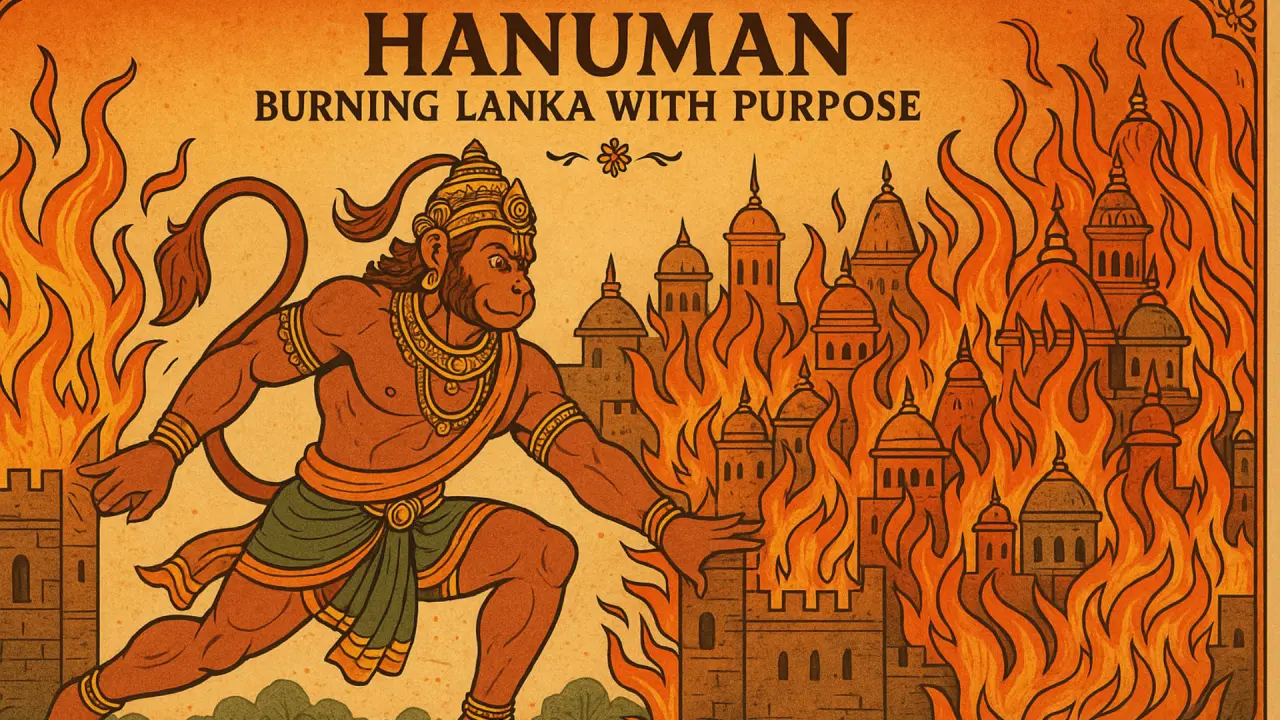





 In this canto we hear the fascinating tale of Gajendra, king of elephants in the celestial realm, who was a saintly king in his previous life. Assailed by a mighty crocodile, he recalls his former devotion to Krishna and invokes his presence with heartfelt prayers. Then begins a long account of a conflict between the gods and Asuras, resulting in several divine incarnations, including Mohini, the Lord’s form as an exquisite female, and Vamana, a dwarf brahmin. The Asuras conquer the heavens and seize control of the universe, only for Vamana to trick the Asura king, Bali, into giving everything back to the gods on the plea of begging for just three paces of land. Finally we hear about Matsya, the Lord’s fish incarnation, who comes to the rescue of King Satyavrata during a great deluge that inundated the worlds. Krishna Dharma and Chintamani Dhama Dasi vividly bring these stories to life while bringing out the profound devotional teachings they evince.
In this canto we hear the fascinating tale of Gajendra, king of elephants in the celestial realm, who was a saintly king in his previous life. Assailed by a mighty crocodile, he recalls his former devotion to Krishna and invokes his presence with heartfelt prayers. Then begins a long account of a conflict between the gods and Asuras, resulting in several divine incarnations, including Mohini, the Lord’s form as an exquisite female, and Vamana, a dwarf brahmin. The Asuras conquer the heavens and seize control of the universe, only for Vamana to trick the Asura king, Bali, into giving everything back to the gods on the plea of begging for just three paces of land. Finally we hear about Matsya, the Lord’s fish incarnation, who comes to the rescue of King Satyavrata during a great deluge that inundated the worlds. Krishna Dharma and Chintamani Dhama Dasi vividly bring these stories to life while bringing out the profound devotional teachings they evince.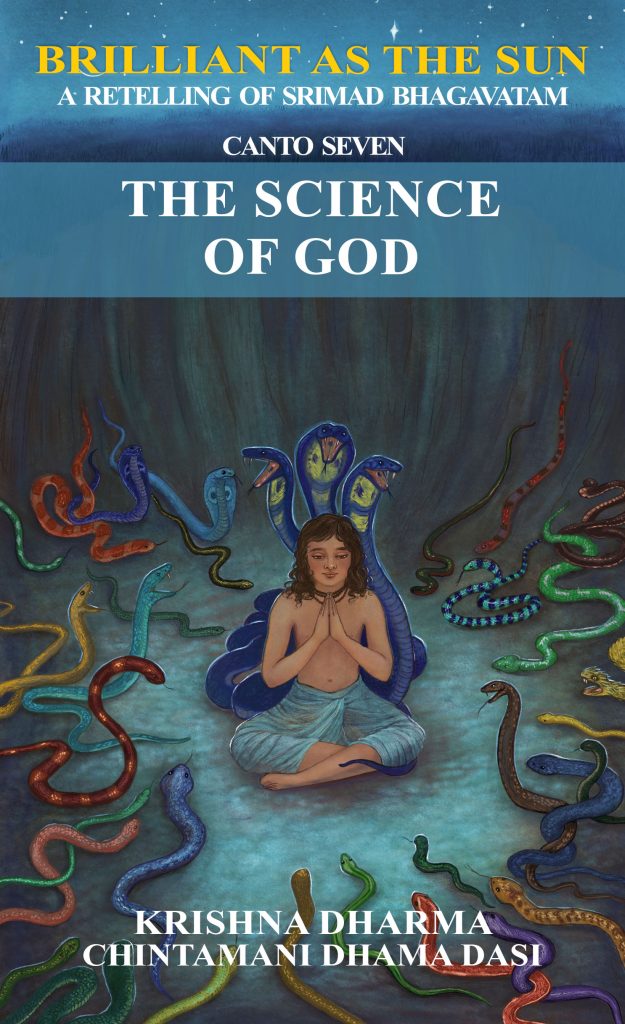 In this canto we first meet Prahlad, a prince in the race of Asuras, fierce enemies of the gods. An exalted saint, he excites the ire of his demonic father Hiranyakshipu by his devotion to Krishna. The demon tries in every way possible to kill his son until at last he is confronted by Krishna’s half man, half lion incarnation, Nrshinghadeva. After this is a conversation between the celestial sage Narada and King Yudhisthira, in which Narada describes in detail the ancient Vedic system of organising society known as varnashrama dharma. A dramatic retelling that vividly brings the text to life and helps the reader go deeply into the transcendental mystery of the great Sanskrit classic, Srimad Bhagavatam.
In this canto we first meet Prahlad, a prince in the race of Asuras, fierce enemies of the gods. An exalted saint, he excites the ire of his demonic father Hiranyakshipu by his devotion to Krishna. The demon tries in every way possible to kill his son until at last he is confronted by Krishna’s half man, half lion incarnation, Nrshinghadeva. After this is a conversation between the celestial sage Narada and King Yudhisthira, in which Narada describes in detail the ancient Vedic system of organising society known as varnashrama dharma. A dramatic retelling that vividly brings the text to life and helps the reader go deeply into the transcendental mystery of the great Sanskrit classic, Srimad Bhagavatam.
 Teachers’ Sanga at Gurukula Monday, 9th June – Gurukula – The Hare Krishna Primary School, located near Bhaktivedanta Manor, hosted a special Teachers’ Sanga (gathering) focused on spiritual growth and insight for educators. The highlight of the event was a talk by His Holiness Svayam Bhagavan Keshav Maharaj, who graciously accepted the invitation to speak
Teachers’ Sanga at Gurukula Monday, 9th June – Gurukula – The Hare Krishna Primary School, located near Bhaktivedanta Manor, hosted a special Teachers’ Sanga (gathering) focused on spiritual growth and insight for educators. The highlight of the event was a talk by His Holiness Svayam Bhagavan Keshav Maharaj, who graciously accepted the invitation to speak By Hemo Krsna dd On Sunday, 8th June, Nottingham’s Market Square hosted its second annual Ratha Yatra festival. Around 1,000 people came together to celebrate this joyful occasion, as Lord Jagannatha, Lord Baladeva, and Lady Subhadra once again graced the city with Their presence. The chariot, brought from London by HG Parasuram Prabhu, was beautifully
By Hemo Krsna dd On Sunday, 8th June, Nottingham’s Market Square hosted its second annual Ratha Yatra festival. Around 1,000 people came together to celebrate this joyful occasion, as Lord Jagannatha, Lord Baladeva, and Lady Subhadra once again graced the city with Their presence. The chariot, brought from London by HG Parasuram Prabhu, was beautifully In this volume, we see how Krishna saves his devotee from degradation. Beginning with the famous story of Ajamila, the brahmin who fell from an exalted position to become a ruthless robber and cheat, only to be miraculously redeemed at the very moment of death. Then we hear how Indra, king of the gods, insulted his guru and as a result was overpowered by the demonic races, led by Vritra, a supernatural colossus who had been conjured for the god’s destruction. The twist in this tale is that the demon was a great saintly devotee of Krishna. Finally, we hear how Diti, mother of the demons, gains her salvation.
In this volume, we see how Krishna saves his devotee from degradation. Beginning with the famous story of Ajamila, the brahmin who fell from an exalted position to become a ruthless robber and cheat, only to be miraculously redeemed at the very moment of death. Then we hear how Indra, king of the gods, insulted his guru and as a result was overpowered by the demonic races, led by Vritra, a supernatural colossus who had been conjured for the god’s destruction. The twist in this tale is that the demon was a great saintly devotee of Krishna. Finally, we hear how Diti, mother of the demons, gains her salvation.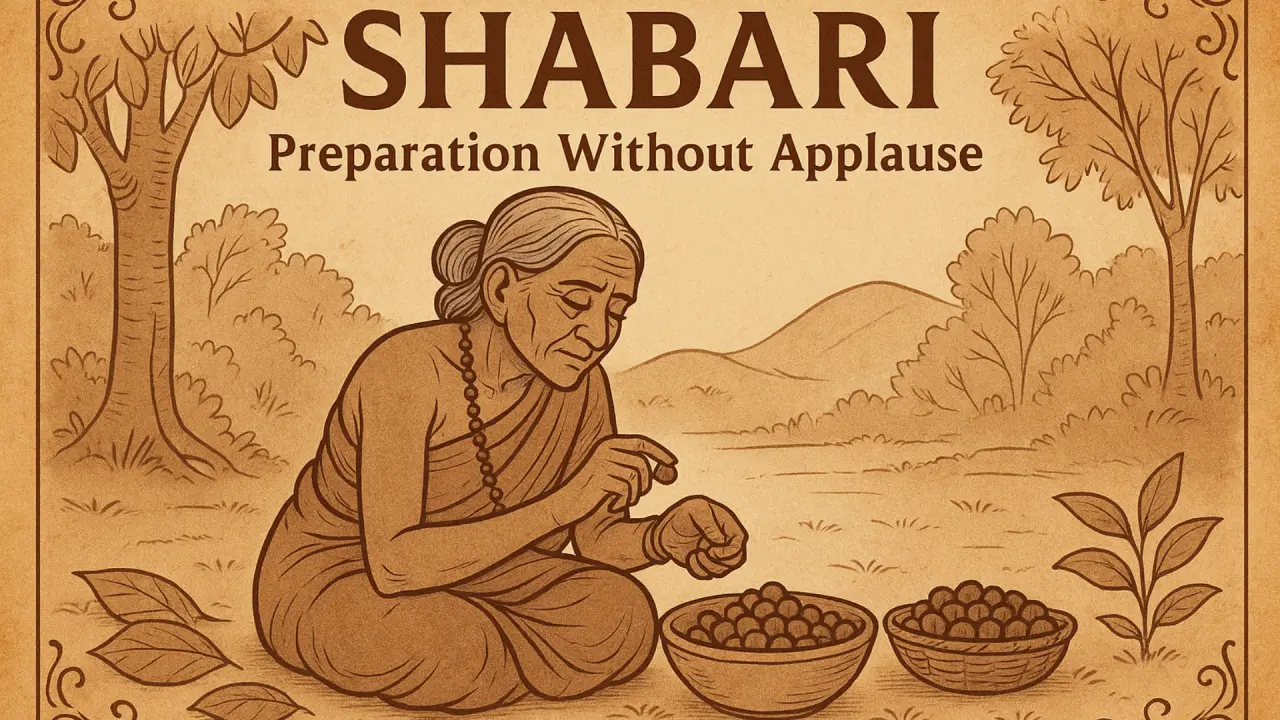




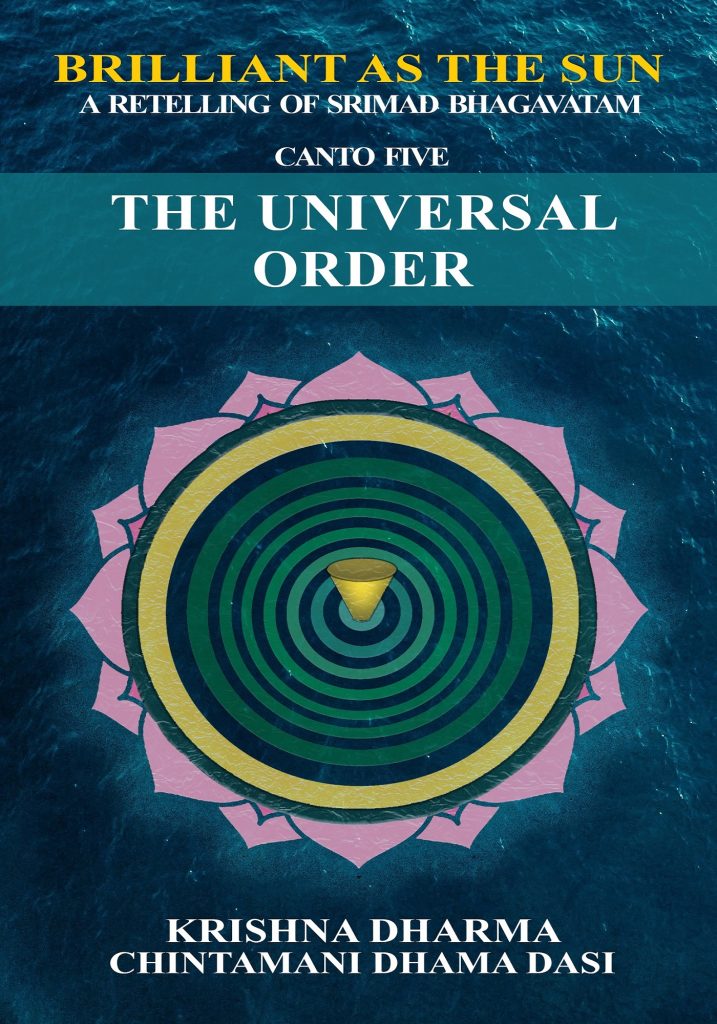 In this volume we first meet the powerful King Priyavrata, who rose to the heavens like a second sun to dissipate the darkness of night and create the divisions of Bhumandala. Then comes his son Agnidhra, who weds the celestial beauty Purvachitti and begets on her nine sons, who each become a lord of one of the provinces of Jambudvipa, the great earthly island on which we reside. One of those sons, Nabhi, begets Lord Rishabha, the divine incarnation famous for showing the path of Jada-yoga, practised by highly advanced mystics. Rishabha delivers profound spiritual instructions to his hundred sons, the most famous of which was Bharat, after whom the earth was named. We hear how King Bharat somehow fell from the pinnacle of spiritual practise and became a deer in his next life. He then took birth as the self-realised soul, Jada Bharat. In a dialogue of astonishing brilliance, Bharat instructs King Rahugana, laying bare the stark reality of material existence and showing us how to conquer the mind and transcend all suffering. After this, the great sage Shukadeva takes us on a fantastic cosmic journey, revealing the structure and intricacies of the universal planetary systems, from the highest regions of heaven down to the paradisical subterranean provinces of Bila Svarga, homes of the Daityas, Danavas and Nagas—dark beings of phenomenal power. Finally, we hear a harrowing description of the many hells that sinful persons reach, essential reading for anyone who wants to get a bit more serious about his spiritual life.
In this volume we first meet the powerful King Priyavrata, who rose to the heavens like a second sun to dissipate the darkness of night and create the divisions of Bhumandala. Then comes his son Agnidhra, who weds the celestial beauty Purvachitti and begets on her nine sons, who each become a lord of one of the provinces of Jambudvipa, the great earthly island on which we reside. One of those sons, Nabhi, begets Lord Rishabha, the divine incarnation famous for showing the path of Jada-yoga, practised by highly advanced mystics. Rishabha delivers profound spiritual instructions to his hundred sons, the most famous of which was Bharat, after whom the earth was named. We hear how King Bharat somehow fell from the pinnacle of spiritual practise and became a deer in his next life. He then took birth as the self-realised soul, Jada Bharat. In a dialogue of astonishing brilliance, Bharat instructs King Rahugana, laying bare the stark reality of material existence and showing us how to conquer the mind and transcend all suffering. After this, the great sage Shukadeva takes us on a fantastic cosmic journey, revealing the structure and intricacies of the universal planetary systems, from the highest regions of heaven down to the paradisical subterranean provinces of Bila Svarga, homes of the Daityas, Danavas and Nagas—dark beings of phenomenal power. Finally, we hear a harrowing description of the many hells that sinful persons reach, essential reading for anyone who wants to get a bit more serious about his spiritual life.